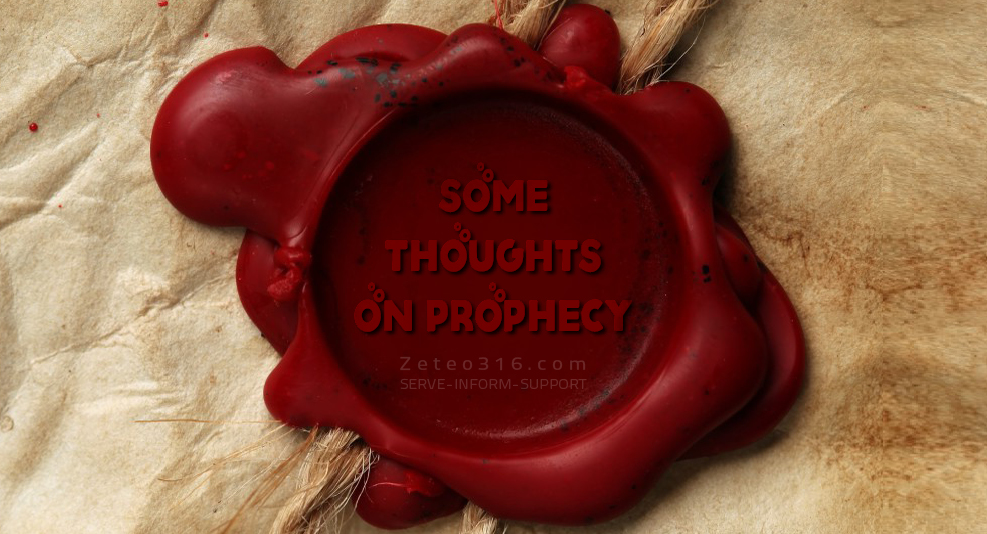
Eschatology is one of my favorite topics – if you haven’t guessed yet. Chances are that, if you’re reading this, it’s also true about you. Discussions about eschatology can be quite passionate and divisive. You might even say they’re often passionately divisive. Here are some of my thoughts on prophecy. Not that anyone asked.
Jack Kelley cites J. Barton Payne to conclude that prophecy constitutes about 26.8 percent of the Bible’s volume. Most of this would be futuristic – as yet unfulfilled prophecy. If around a quarter of Bible is about future events, then ought we not pay attention to this?
In an edifying TMS article Michael Vlach writes:
It is concerning that some churches today don’t take eschatology seriously. The very fact that God has revealed so many details about events to come in both testaments tells us that it is important. At the center of biblical eschatology is the blessed hope of the appearing of our great God and Savior, Jesus Christ (Titus 2:13). Not only should we be interested in prophetic events to come, we are also looking for our Savior, with whom we will spend eternity.
Mike Vlach gives us seven good reasons churches should take eschatology seriously. You can read the details for yourself. These are the seven sub-headings:
1) Eschatology is a major part of the Christian storyline
2) We are called to heed and preach the whole counsel of God
3) People are interested in the future
4) Eschatology is a motivation for believers
5) Eschatology has a purifying effect on the believer
6) Eschatology gives perspective to the troubles and trials of this age
7) Eschatology warns the believer of coming judgment
I particularly liked reasons 4 and 5, which are strongly connected. Vlach observes:
Why should we live sensibly, righteously and godly? Because Jesus is coming again. 1 John 3:2-3 states, “Beloved, now we are children of God, and it has not appeared as yet what we will be. We know that when He appears, we will be like Him, because we will see Him just as He is. And everyone who has this hope fixed on Him purifies himself, just as He is pure.”
As noted in a previous article, Charles Spurgeon understood the value of Christians living in constant expectation of Christ’s any-moment return.
Sadly, prophecy can also be a two-edged sword. Broadly speaking, Christians often disagree with each other regarding eschatology. The one major area of agreement is our final state in Christ – the Eternal State. All other details are up for debate – some of it passionately intense and often contentious.
Happily, I attend a church which holds tightly to the gospel and fundamentals of biblical doctrine. However, it defaults to the Reformed Amillennial view. The good news is that the sermons (rightly) focus on the gospel and the Christian’s relationship with our Triune God. The lead pastor wisely understands that his congregation encompasses a range of eschatological viewpoints. Hence, any eschatological points tend to be about our eternal joy in God.
If this church was as passionate about eschatology as I am, I’d foresee some challenges. For example, I’m an avowed premillennialist, not a pan-millennialist! Our conversations would have to be conducted in grace and love. Still, I know there’s little likelihood that anything I say would convert a committed amillennialist. This being the case, I’m thankful there’s no division, and am content with studying prophecy in my own time.
Even among premillennialists, there are areas of (often) divisive disagreement. Historic (Historicist) premils generally see no future for national Israel. With few if any exception they are posttribulational. Among futuristic premils there are at least four different rapture timing views: pretrib, midtrib, prewrath and posttrib. And we all know how well everyone gets along on that topic, right?
Over the years I’ve come across comments by several prewrath people expressing their desire of finding a prewrath church. It’s understandable. I’d feel uncomfortable sitting in the pew as the pastor preaches a viewpoint I fundamentally disagree with. Given the polemic comments I’ve seen over the years against pretribulationism, I’d avoid sermons on eschatology in a posttrib-prewrath church.
But should a pastor even preach prophecy on a Sunday? Or should he focus on worship, the gospel and feeding his flock? Why do we gather together on a Sunday? I’m sure there are a wide variety of opinions out there. And I do understand that prophecy is often taught in weekly Bible studies.
As stated earlier, prophecy can be a two-edged sword. Even among those of us who agree in our eschatology, I sometimes wonder if we place an unbalanced emphasis on it. Is our passion for prophecy so consuming that it robs time from other important aspects of our Christian lives?
There are two important messages in Acts 1:6-7, in my opinion. The first (as Matt Waymeyer has capably demonstrated) is that Christ affirms the disciples’ longing for Israel’s restoration. Yet in His response Christ also infers that their primary focus at this time should be on proclaiming the good news.
It bothers me that I don’t always proclaim the gospel to the unsaved. The few times I do, I tend to botch it up. Yet if we live in expectation of Christ’s imminent return, we ought to live as Spurgeon advised. Sadly, I too often waste precious time in trivial pursuits and idolatrous addictions. How about you?
Let’s all get to work. He is coming!
Let not your heart be troubled; you believe in God, believe also in Me. In My Father’s house are many mansions; if it were not so, I would have told you. I go to prepare a place for you. And if I go and prepare a place for you, I will come again and receive you to Myself; that where I am, there you may be also. John 14:1-3
Maranatha!
